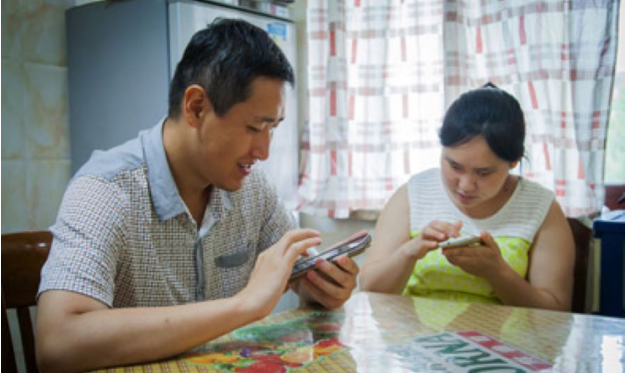
Visually impaired Sun Tao, and his wife Wang Rui use smartphones at home. [Photo/Xinhua]
Beijing - As lyrics stream across his mobile phone screen, 26-year-old Li Longhua belts out a few of his favorite pop tunes. For this visually impaired masseur in east China's Nanchang City, singing has become the highlight of his day.
Benefiting from the special design of Changba, a singing app, sight-impaired people like Li are able to enjoy the fun of singing in a"portable solo karaoke booth."
"It has made my life easier and more fun. I often offered suggestions to the app, and its engineers took on my advice and kept improving the barrier-free services," said Li.
"Visually impaired users cannot see the lyrics. Our app can remind them of the words via voice prompts," said Tony Chen, founder and CEO of Changba Music Group, adding that nearly all the 500 functioning pages of Changba have been optimized to offer a better user experience for the blind and partially sighted people.
Internet companies like Changba in China are stepping up efforts to make the lives of the disabled easier by providing barrier-free services. According to incomplete statistics, by the end of 2019, more than 40 Internet companies had set up departments in charge of barrier-free information.
For 39-year-old Wang Zhihua, a blind Beijing resident, technologies have changed his life and even fate.
"I used to be afraid of hailing a taxi on the roadside. I did not know which vehicle was a taxi, and many cab drivers simply rejected me to avoid trouble. Sometimes, a police car would stop to see what had happened. But all I needed was a taxi," Wang recalled.
When ride-hailing apps emerged, Wang was thrilled."At first, the apps were not very friendly to blind users. For instance, I didn't know how to evaluate the drivers' performance, and some pages popped up and interfered with the payment process," he said.
Wang and his friends reported these bugs to the relevant companies. Fortunately, their suggestions were mostly accepted.
At the end of 2019, Wang became an employee for Didi Chuxing, a leading ride-hailing service in China. He is responsible for evaluating the app's function for visually impaired users.
"My childhood dream was to become a masseur. I never expected that I would be able to use a computer and smartphone and even work for an Internet company," he said.
Some Chinese tech companies have developed tailored apps for the visually impaired, allowing them to order food online, watch barrier-free movies, play games and read books via technologies including speech recognition and voice interaction.
Beijing Prudence Interactive Technology Co., Ltd. has launched a mobile game for people with visual impairments.
"The visually impaired still face many challenges in the era of mobile Internet. We provide content and a social circle for them. Many users get to know each other through our games, and some even get married," said Yang Jun, general manager of the company.
China has about 85 million disabled people, with about 12 million visually impaired, according to the China Disabled Persons' Federation.
"With a large disabled population and an aging society, visual disabilities will present greater obstacles to people's lives, entertainment and communication. This will require concerted efforts from more tech companies to solve," Yang said.

